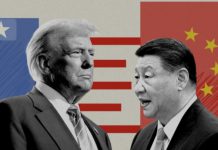Turkish military has launched an all-out assault named operation ‘Olive Branch’ in Afrin region of Syria, where the US backed and Kurds formed YPG is operating. The timing is very important. On the one hand, one of the key actors in Middle-Eastern geopolitics, the US is in deep domestic political crisis over Trump’s performance as the 45th president of the US. And on the other hand, Russia ahead of the presidential election, has been limiting its presence in a post-ISIS Syrian battle ground. At the same time, after a nationwide protest and frequent threats from the US-Israel to scrap the Iran nuclear deal, Iran is also keeping a low profile in Syrian crisis. Saudi Arabia, another important actor in the Middle East, is also in domestic political crisis. Several billionaires and potential power adversaries were put behind bars in order to implement Saudi crown prince Mohammad Bin Salman’s ongoing reform program. Finally, Israel- surrounded by foes, is and will be seeking opportunity for strategic influence over a single event or clash in the region and the country has been maintaining a sound and stable diplomatic relation with Turkey as well. But everybody has red lines. To avoid major confrontation with the geopolitical actors, Turkey, with a neo-Ottoman spirit, will exploit but not cross those red lines.
Turkey, for her geographical location that connects the Middle East with the Western world, enjoys enormous geopolitical and geo-economic opportunities. The country has been working on connecting the Europe and Asia with rail ways. An 826-kilometer (500-mile) rail link (the Baku-Tbilisi-Kars or BTK railway project) connecting Azerbaijan, Turkey and Georgia were launched in October last year. For Russia, 63 billion cubic meters of gas can be supplied only through Turkish Stream to Europe since Russia thinks the existing pipeline through an adversarial Ukraine is in high risk. As a NATO member country, Turkey also enjoys a diplo-military support and shield from her western allies, although, the so called Gulen coup attempt had significantly strained the relationship with the US. On the other hand, Turkey’s long sought but not-yet-granted EU membership status and Europe’s refugee crisis are two major obstacles between Turkey-EU relationships putting Turkey in a position to get close to China-Russia envisioned alternative world order.
Understanding her geopolitical and geostrategic importance, Turkey can move with fewer obstacles inside Syrian battle field than others. Although, the Kurdish forces inside Syria was heavily armed by the US- Israel led forces, they cannot engage with Turkish forces without the US nod. It is quite understandable that Turkey managed to convince the US bloc that she would not cross the Euphrates River and her military assault would be limited to the Kurdish “terrorist” forces in Afrin and Manbij regions only. There were reports that Russian forces inside those regions were warned by Turkey and as a result Russia withdrew her active personnel. It is also suggested by some analysts that Assad’s threat against Turkish warplanes was nothing but a Russian try to bargain with Turkey regarding the “Olive Branch” campaign, but it didn’t work since Turkish leverage was higher than that of Russia in the region.
Kurds have a strong presence in Turkish politics; decades long conflict between Kurdish hardliners and Turkish neo-Ottoman establishments has been hampering Turkish internal security and creates a noisy barrier for Turkish vision in the Middle East region. The US led bloc has been providing military resources to Kurds for its own geostrategic objectives of continuing support for Israel, to contain the inevitable Turkish neo-Ottoman rise in the region, to check and balance Russian and Chinese influences and to create a threat for sovereignties of Iran and Iraq. Since there is no regional consensus for ‘the Kurdistan’, the US –Israel bloc finds itself in a difficulty dealing Kurds at this moment. Therefore, the US may decide to relocate its support for Kurds only for the eastern side of the Euphrates. As a result, if Turkey enters into the Manbij region after conquering the Afrin region, Turkey may face the intensity of resistance by the Kurdish forces where diplomacy will play the bigger part in winning the battle.
By : Ahmed Rajeev, a Geopolitical and Security Analyst
















